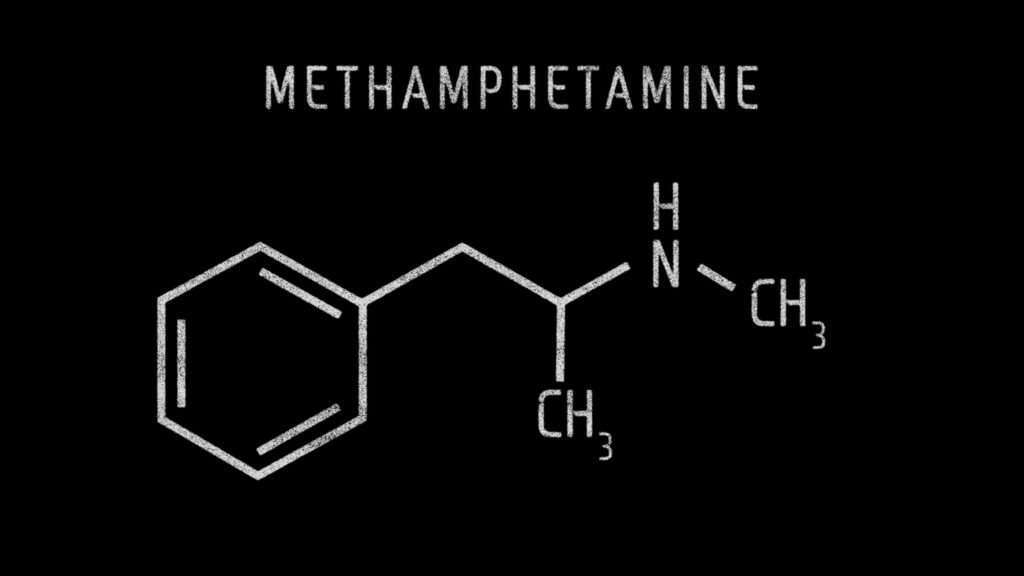What Does Meth Do to the Brain?
Substance use disorder is not easy, especially if the substance in question is methamphetamine. Accepting the reality of all of this is difficult, to say the least. If someone doesn’t get ahold of their addiction quickly, it could spell trouble for their brain and mind long-term. There are a great many consequences of meth addiction, but most of them have to do with their effect on the mind. In addition to this, it is not necessarily easy to seek out treatment.
The symptoms of meth addiction and the result of withdrawal is quite uncomfortable and painful. Luckily there are options to consider for treatment. But what is meth, and why is it so addictive?
Table of Contents
ToggleWhat is Meth?
 Methamphetamine is a powerful and highly addictive stimulant that has a long history of being used as a recreational drug. Methamphetamine can be snorted, smoked, injected, or swallowed. It produces an intense feeling of euphoria and energy, and users often report feeling more alert and awake after taking it.
Methamphetamine is a powerful and highly addictive stimulant that has a long history of being used as a recreational drug. Methamphetamine can be snorted, smoked, injected, or swallowed. It produces an intense feeling of euphoria and energy, and users often report feeling more alert and awake after taking it.
Methamphetamine is also known to increase libido and produce feelings of invincibility. Methamphetamine is highly addictive, and users can develop a dependence on the drug very quickly. Meth addiction often leads to serious health problems, including heart damage, liver damage, and brain damage. In some cases, meth addiction can even lead to death.
How Does Meth Addiction Start?
In short, meth addiction starts due to its highly addictive nature and potential. Not only that, but when a person takes it, it has a long-lasting effect on the central nervous system. Meth isn’t just the illicit crystal form used for getting high; meth is technically any methamphetamine, which includes medication, especially medication that treats attention disorders. The most common of the disorders treated for meth is attention deficit hyperactivity disorder (ADHD). In addition to this, methamphetamines are also sometimes prescribed for weight loss.
What are the Effects of Meth Abuse?
The effects of meth, regardless of whether it’s illicit crystal meth or medically prescribed, are quite elaborate. For example, those who use meth tend to exhibit more talkativeness than usual, hyperactivity, an intense loss of appetite, and a sense of euphoria. For those using, or abusing meth, the effects are pleasurable in regards to the euphoria that is felt.
How Can I Tell if Someone is Addicted to Meth?
There are many ways to tell whether or not a person is struggling with a meth addiction. Some of these indicators include the following:
- Talkativeness
- Hallucinations
- Paranoia
- Scratching
- Poor dental health (rotting teeth)
- Acne
- Irritability
- Mood swings
- Anxiety
- Sores
- Weight loss
There are many recognizable symptoms of meth abuse. One of these includes rotting teeth, also known as meth mouth. Meth mouth is a term used to describe the extensive tooth decay and damage that can be caused by methamphetamine abuse. The drugs cause users to grind their teeth, as well as dry out their mouths, which leads to an increased risk for cavities and other dental problems. Treatment for meth mouth typically involves a combination of dental cleanings, fillings, and extractions. In severe cases, dentures may be necessary. There are a number of ways to prevent meth mouth, including:
- Brushing and flossing regularly
- Using a fluoride toothpaste
- Avoiding sugary drinks
- Not smoking or using tobacco products
- Visiting the dentist regularly for checkups and cleanings
While meth mouth is a serious problem, it is important to remember that it is just one of the many dental problems that can be caused by meth abuse. Not only does meth abuse damage the mouth and teeth but it also has a detrimental impact on a person’s mind.
What Kind of Effect Does Meth Have on the Brain?
 When a person uses (or abuses) methamphetamines, they will more than likely experience a decrease in interest in activities they used to love; this is true for most substance abuse issues. Not only that, but those struggling with addiction also have a hard time being motivated to do anything at all. This is dangerous and has the potential to end relationships and be a detriment to a person’s personal, professional, and academic life.
When a person uses (or abuses) methamphetamines, they will more than likely experience a decrease in interest in activities they used to love; this is true for most substance abuse issues. Not only that, but those struggling with addiction also have a hard time being motivated to do anything at all. This is dangerous and has the potential to end relationships and be a detriment to a person’s personal, professional, and academic life.
When a person starts abusing drugs or alcohol, it may seem as though everything is just fine and dandy. Unfortunately, this is not the case. Most often, those struggling with a substance use disorder are great at hiding it. Hiding one’s issues begins to become a part of their life, not even being a second thought in most cases. However, after quite some time, it becomes more obvious that a person is struggling with a substance use disorder. This is because their priorities begin to slip through the cracks while substance abuse becomes the top priority.
Methamphetamine is a powerful stimulant drug that can have devastating effects on the brain. Meth use can cause increased heart rate and blood pressure, which can lead to strokes and heart attacks. Meth also causes damage to the brain’s white matter, which can lead to problems with memory and decision-making. Additionally, meth use can lead to psychotic symptoms such as paranoia and delusions.
The Stages of Meth Addiction?
Methamphetamine, or meth, is a highly addictive stimulant drug that can have serious consequences. People who struggle with meth addiction may go through different stages of the addiction, including:
- Experimentation: Some people may try meth once or twice out of curiosity. However, others may quickly develop a tolerance and need to use more of the drug to get the same effects.
- Regular use: Some people who use meth regularly may start to miss work or school, isolate themselves from friends and family, and engage in risky behaviors.
- Addiction: People who are addicted to meth may continue using the drug despite negative consequences. They may also experience intense cravings and withdrawal symptoms when they try to quit.
The stages of meth addiction are a real thing, and meth addiction can have a devastating impact on the quality of a person’s life. Meth addiction can have a profound and devastating impact on an individual’s life. It can destroy relationships, cause financial ruin, and lead to health problems. Meth addiction is a serious problem that should not be taken lightly. There are many resources available to those struggling with meth addiction, and it is important to seek help if you or someone you know is struggling with this problem.
What are the Short-Term Effects of Meth Abuse?
Short-term effects of meth abuse can include the following:
- Increased heart rate and blood pressure
- Nausea and vomiting
- Diarrhea
- Abdominal cramps
- Muscle tremors
- Seizures
- Hallucinations
- Paranoia
- Aggressive behavior
What are the Long-Term Effects of Meth Abuse?
Meth abuse can lead to serious health problems, including heart attack, stroke, and organ damage. It can also cause cognitive impairments, memory loss, and psychotic symptoms. In some cases, meth use can lead to death. Meth addiction is a serious problem that can have lasting effects on a person’s health and well-being. Treatment is available, but it can be difficult to overcome an addiction to meth. If you or someone you know is struggling with meth addiction, there is help available.
What are the Treatment Options for Meth Addiction?
There are many treatment options for meth abuse, some of which include the following:
- Inpatient residential treatment
- Medically assisted detox
- Holistic treatment
When a person is struggling with meth addiction, it is completely possible to feel isolated or without support. However, nobody ever walks alone. Those who walk through a substance use disorder deserve the utmost in individualized treatment. At First City Recovery Center, this is entirely possible. Through our system of care and addiction treatment programs, those struggling with meth abuse can overcome their circumstances and move forward on the path of sobriety.
Inpatient addiction treatment is an addiction treatment option in which the patient lives at the facility for the duration of their treatment program. This type of addiction treatment is typically very intensive and focused, and patients receive around-the-clock care and supervision. Inpatient residential addiction treatment programs typically last for 30 days but can be shorter or longer depending on the needs of the patient.
Inpatient residential addiction treatment is often considered to be the most successful type of addiction treatment, as it allows patients to focus completely on their recovery without any distractions or temptations. This type of addiction treatment also offers a higher level of support and supervision than outpatient treatment programs, which can make it easier for patients to stay on track with their recovery. Inpatient addiction treatment programs typically cost more than outpatient treatment programs, but they may be covered by insurance or financial assistance programs.
Medically assisted detox is a process of withdrawing from a substance with the help of medication. It is often used as the first step in addiction treatment, as it can help to manage the symptoms of withdrawal and make the process more comfortable. Medicated detox can be done in an inpatient or outpatient setting, depending on the individual’s needs.
Holistic treatment is an approach to addiction recovery that focuses on the whole person, not just their addiction. This method of care involves practices that focus on the mind, body, and spirit. This includes yoga, meditation, nutritional therapy, exercise therapy, and many more.
Meth Addiction Isn’t Impossible to Overcome – Reach Out Today
Meth addiction isn’t unbeatable. This is because, at First City Recovery Center, we treat each case on an individual basis; we believe those who suffer from substance use disorder all come from different walks of life. The uniqueness of their treatment should reflect that to be successful. If you or a loved one are suffering from meth addiction and want help today, you can contact us here.

MD, Psychiatrist
Dr. Vahid Osman, MD is a psychiatry specialist in Indianapolis, IN.
Dr. Osman completed a residency at Austin State Hospital. He has over 32 years of experience in Psychiatry & Behavioral Health. He is board certified by the American Board of Psychiatry and Neurology.




